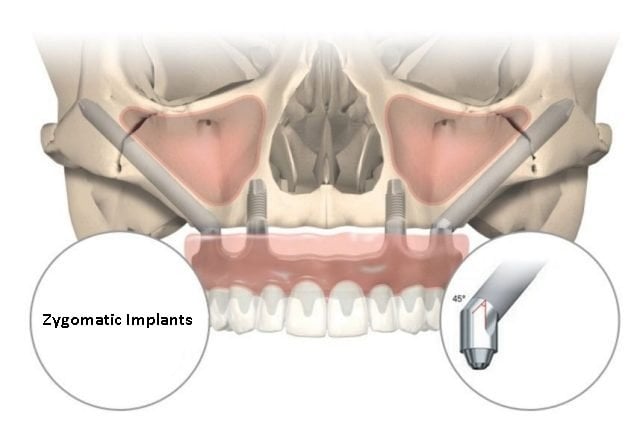
Many patients who have significant bone loss in their upper jaw are told by their dentist that they don’t have enough bone for dental implants. Sometimes their bone has even dissolved under their nose.
While this may pose difficulties for some dentists, when you're working with an AAID dentist who has the extensive education, training and experience required to make sure your dental implant procedure is a success, they will be knowledgeable about alternative solutions, such as zygomatic implants.
What are zygomatic dental implants?
Zygomatic dental implants are a solution for patients who have the most severe form of bone loss in their upper jaw. Think of it as an alternative to bone grafting.
The procedure has a long track record of success. It was first introduced into the United States in 1998, but it's been used in Europe since 1988.
How do zygomatic implants work?
Differing from endosteal and subperiosteal implants, which are placed either on or above your jawbone, zygomatic implants are anchored in your cheek bone, which is called the "zygoma."
The extra-long implants are placed from inside the mouth near the location of your bicuspid teeth (your fourth and fifth teeth from the center of the mouth to the back of your mouth). The implant then anchors into the thick, solid zygomatic bone. 
Having additional support in the upper jaw is always good for the longevity of dental implant restorations in the upper jaw where the bone is typically very soft. Because of this it's a very safe and predictable procedure.
What are the advantages of Zygomatic Implants?
- Natural teeth can be extracted and zygomatic implants can be placed at same appointment
- You can leave with functioning teeth on the same day of the surgery
- Upper denture is eliminated
- No major bone-grafting necessary
- They reduce time of upper jaw restoration
- 1 extra-long zygomatic dental implant is about 3-4 regular dental implants
- In some cases, it can reduce cost
- Old, failing All-On-X dental implants with bone loss can be removed and easily replaced with zygomatic dental implants
Are zygomatic dental implants painful?
The pain associated with zygomatic implants is about the same as any regular bone-grafting procedure.
Most of my patients are pretty amazed about how painless and easy the procedure is. They usually do not need pain killers, but rather end up using a combination of Ibuprofen and Tylenol.
If you are worried about pain, a special anti-inflammatory can be administered in your shoulder and in your IV sedation to help reduce postoperative pain.
What are the risks of zygomatic implants?
Just like any other complex oral procedure, there are risks.
When there is little to no bone present, dental implant and bone grafting procedures carry some degree of risk. No discussion with your dentist would be complete without discussing this.
You can read more about the potential risks of zygomatic implants on my dental implant practice's website, Burbank Dental Implants.
Are zygomatic implants right for you?
If you have extreme bone loss in your upper jaw, zygomatic implants offer a safe and predictable solution. They're also a way to decrease cost and treatment time.
In addition to that, zygomatic implants are much less invasive than other dental implant treatments for severe bone loss of the upper jaw.
If you have previously lost teeth and are considering dental implants, be sure to see an AAID dental implant expert. You can use the Find an Implant Dentist tool to find an AAID dentist closest to you.
This blog post was written by Dr. Ramsey Amin, DDS, FAAID of Burbank Dental Implants in Burbank, CA.
Dr. Ramsey Amin has extensive experience in surgical and restorative implant dentistry. As one of only less than 600 Diplomates of the American Board of Oral Implantology/ Implant Dentistry (ABOI/ID) he is considered an expert, and board-certified in dental implants. He is a former instructor at the UCLA School of Dentistry.
![]() What are those letters after the dentist’s name? Find out what they mean.
What are those letters after the dentist’s name? Find out what they mean.





